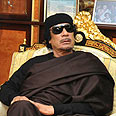
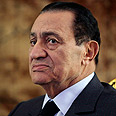


Israel's new strategic front – In the backdrop of the dramatic changes taking place in the Middle East, regional powers are trying to determine how the popular uprisings in Libya, Egypt and Tunisia affect the power balance in the area. At the focus of attention is the continent of Africa, which has become a new battleground between Israel and Iran.
For the first time since the "Arab Spring" began, the African Union will hold its 17th biannual convention in the capital of Malabo, Equatorial Guinea.
- Receive Ynetnews updates
directly to your desktop
Though the conference usually addresses the interests of African states, this time the discussion is expected to center around the revolutions that took place in the union's two strongest Arab states – Libya and Egypt.
Other than the obvious regional consequences of the uprisings and regime change, the dramatic events are also expected to have an impact on the region's security, with external elements such as Iran trying to extend their control on the continent while Israel and its allies attempt to prevent its steps.
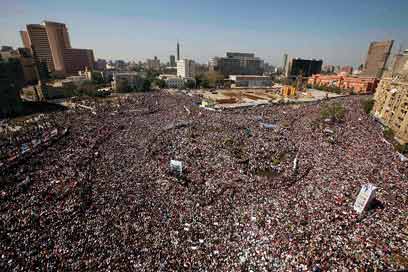
Revolution created opportunity. Tahrir Square, Cairo (Photo: Reuters)
Iran's involvement in Africa began prior to the "Arab Spring", as it was striving to tighten relations with African nations and organizations.
Only last October, Nigeria intercepted a large arms shipment en-route from Iran to Gambia. Shortly after the incident, the countries severed their ties with the Islamic Republic. Four months ago, Senegal followed suit after it exposed Iranian military equipment designated for rebel forces in the country.
Security sources acknowledge that Iran has been trying to exploit the instability that has spread in the region since the uprisings first began, in order to tighten its grip in the area. Israel's main concern is the armories in Libya, which might fall into the wrong hands.
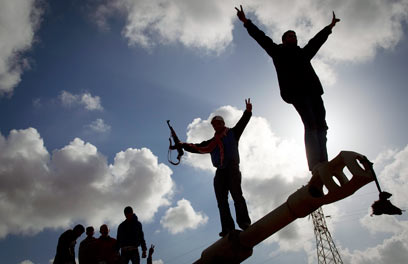
Rebels in Libya. Arms falling into wrong hands? (Photo: AP)
"The rebels are taking control of the area, and some reports claimed they took possession of anti-aircraft shoulder missiles," said a security official in Jerusalem, adding that chemical material storages are currently being guarded, but might also fall into the hands of hostile elements.
"It is not science fiction to think that these materials can cross the border to Egypt and from there to Gaza," the official warned.
'Turn to the worst'
Israel's relationship with Africa has seen its ups and downs since it first started forging ties in the continent during the middle of the 20th century.
Many of these relations were made possible through the Center for International Cooperation (Mashav), which acted to promote joint projects in the fields of agriculture, medicine and education.
In 1963, as many African states were gaining independence, the Organization of African Unity (OAU) was established with the aim of furthering its members' interests around the world.
The organization was reestablished as the African Union in 2002, an event that marked a turning point in its relations with the Jewish State.
"Until 2002 we had good relations with the organization," said Jacques Revah, the deputy general-director of the Foreign Ministry's Africa division. "The Arab states did give us trouble, but we were nevertheless a welcomed guest at the organization's top echelons.
"However, with the creation of the African Union, the rules of the game turned for the worst for Israel," he said.
Nowadays, the organization has 53 member-states. "Israel has diplomatic relations with 39 out of the 47 states south of the Sahara, while the Arab states make up the rest of the members," said Revah.
"Paradoxically," he added, "while Israel's individual ties with most of the states are good – even excellent – the relationship with the organization as a while is not good."
Revah noted that even though the organization is not hostile toward Israel, the pressure applied by the Arab League coupled with states joining the "nonaligned" bloc, which tends to promote the interests of the third world "does not play in our favor."
During the last decade, Egypt and Libya have played a dominant role in African Union. "(Libyan leader) Muammar Gaddafi initiated resolutions that condemn Israel and saw the organization as the first step towards a "united states of Africa," said Revah.
"He invested huge amounts of money and became the patron of some of the African states, who caved to his demands, while ridiculing him and his policies behind closed doors," he added.
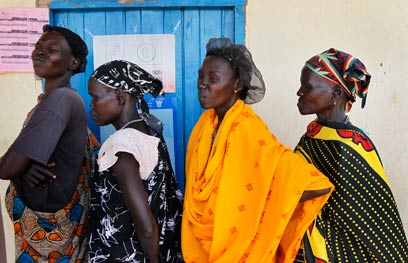
Sudanese women queuing at polling station (Photo: Reuters)
Now, with the military battle that is taking place over Libyan lands, the Foreign Ministry hopes the organization will be able to act more freely, without Gaddafi's funds and influence.
Unlike Libya's diligence, Egypt's attitude vis-à-vis Israel was somewhat more equivocal. While it opposed Israeli involvement in the continent, it "stood guard" on the Egypt-Gaza border and tried to intercept Iranian expansion.
Israel is now concerned that Iran might attempt to fill the void created by former Egyptian President Hosni Mubarak's ouster.
After the revolution, most resources have been directed at jumpstarting the Egyptian economy, however officials in Jerusalem estimate that this is only a temporary setback.
The division of Sudan, which will become an established fact at the UN General Assembly vote on July 10 is "a critical step for Egypt, especially because of its main water resource – the Nile River. Hence, it is not stepping out of the arena, but the contrary – it wants more control," said the official.
Next month will prove critical in Israel's strategic battle over Africa. The African Union summit, Sudan's division and the opening of a new Israeli embassy in Accra, the capital of Ghana are all significant developments that will bear weight on Israel's regional status.
"Iran sees these developments as opportunities, and therefore Israel's presence is important," explained the official, noting that the changes mark a "new strategic horizon" for Israel.
"Who knows," he added, "maybe we'll also soon have a representative in the African Union."
- Follow Ynetnews on Facebook















